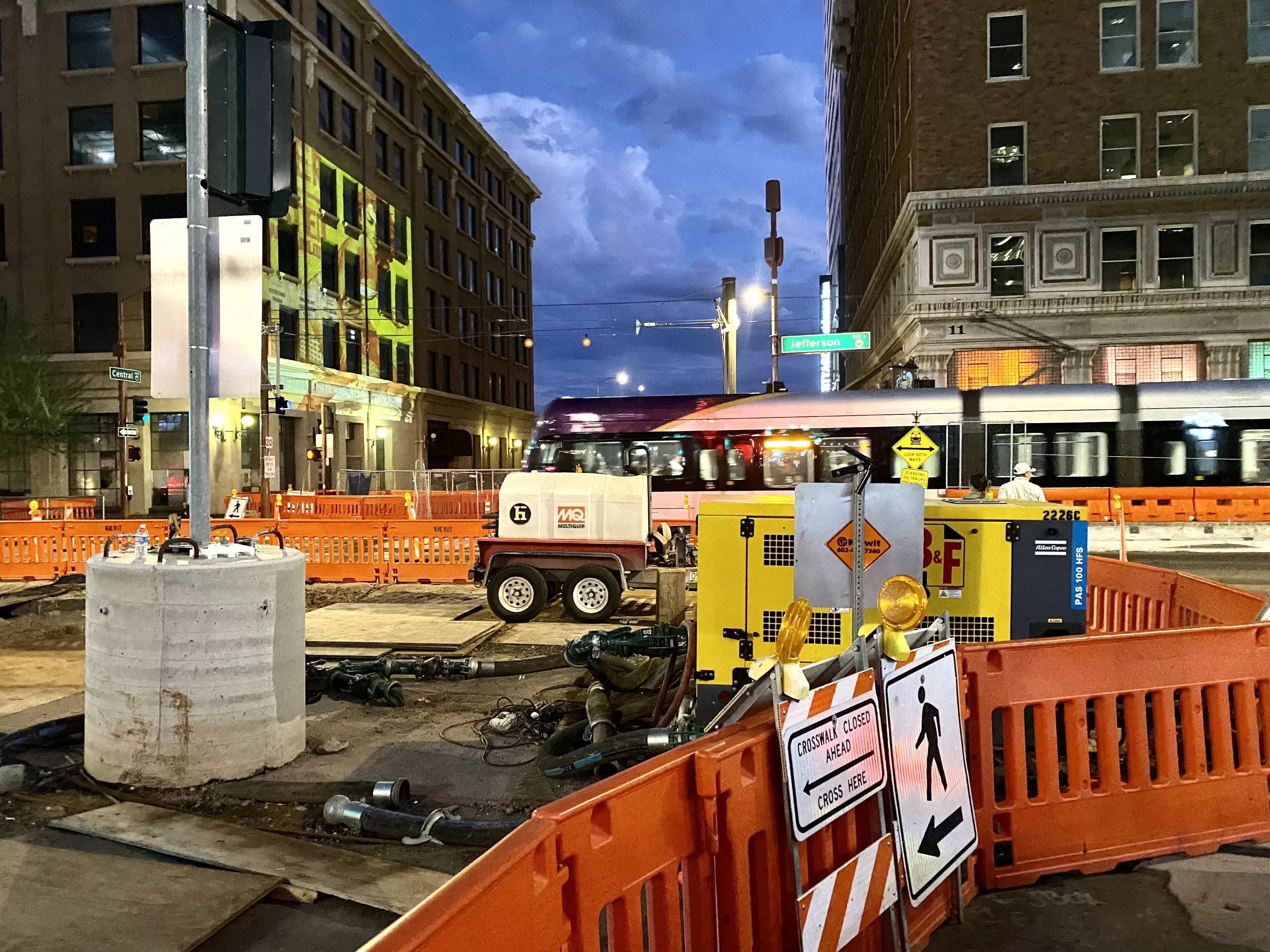
Natasha Yee

Audio By Carbonatix
Editor’s note: This story was updated on October 14 to include additional assistance that Valley Metro and the city of Phoenix offers to businesses impacted by the light rail construction, as well as the transit system’s response to some criticisms of the assistance.
As you drive south from downtown Phoenix, orange traffic cones litter Central Avenue. Drivers weave in and out of makeshift lanes as their GPS systems woefully try to sort out the madness.
The construction started in October 2019 and for small businesses such as Tres Leches Café, a coffee bar with a drive-thru location in South Phoenix, it has meant a major drop in sales. The coffee shop, located at Central Avenue between Roeser Road and Southern Avenue, closed for over a year after construction began.

Magaly Martinez Saenz poses with her daughter Lola at Tres Leches.
Magaly Martinez Saenz
“We missed out on what would have been $1 million in generated sales that year, which is insane,” says Magaly Martinez Saenz, who runs Tres Leches with partner ET Rivera.
The Valley Metro South Central Extension/Downtown Hub project spans 5.5 miles, extending the current downtown Phoenix light rail system south to Baseline Road. The project includes a new hub in the heart of the city, eight new stations, public art, and two park-and-rides, where commuters can drive their cars to a stop, park for free, and ride the light rail to their destination.
The city is aware of the challenges the construction presents for local businesses. It created a funding program in conjunction with Valley Metro and Prestamos CDFI, which stands for Community Development Financial Institution, to ease the burden, offering businesses a grant of up to $9,000. The Small Business Financial Assistance Program (SBFAP) began in 2021 and will continue through 2024 to aid mom-and-pop restaurants and bars, along with other businesses, through the construction.
Some businesses have received funding, but many are still struggling to make ends meet as potential customers have difficulty finding their way around the city and securing parking spots.
The owners of Tres Leches applied for the funding, but the SBFAP denied it, claiming that the business made too much money to qualify. When Martinez Saenz told the organization that the coffee shop had been shut down from March to April of 2020, then again in March 2021 to June 2022 due to all the blockages surrounding it, she was asked to resubmit her application with additional information.
Then Martinez Saenz noticed a waiver and release form toward the end of the application requiring her to “compromise, settle, forever release, waive, discharge, and relinquish any and all past and present claims, demands, losses, damages, rights, remedies, or causes of action for construction related revenue reduction.”
She decided not to resubmit the application.
“That did not sit well with me. I don’t know if I would ever have the time or resources to bring that sort of lawsuit forward, but I don’t want to remove the possibility of it ever happening,” Martinez Saenz says.
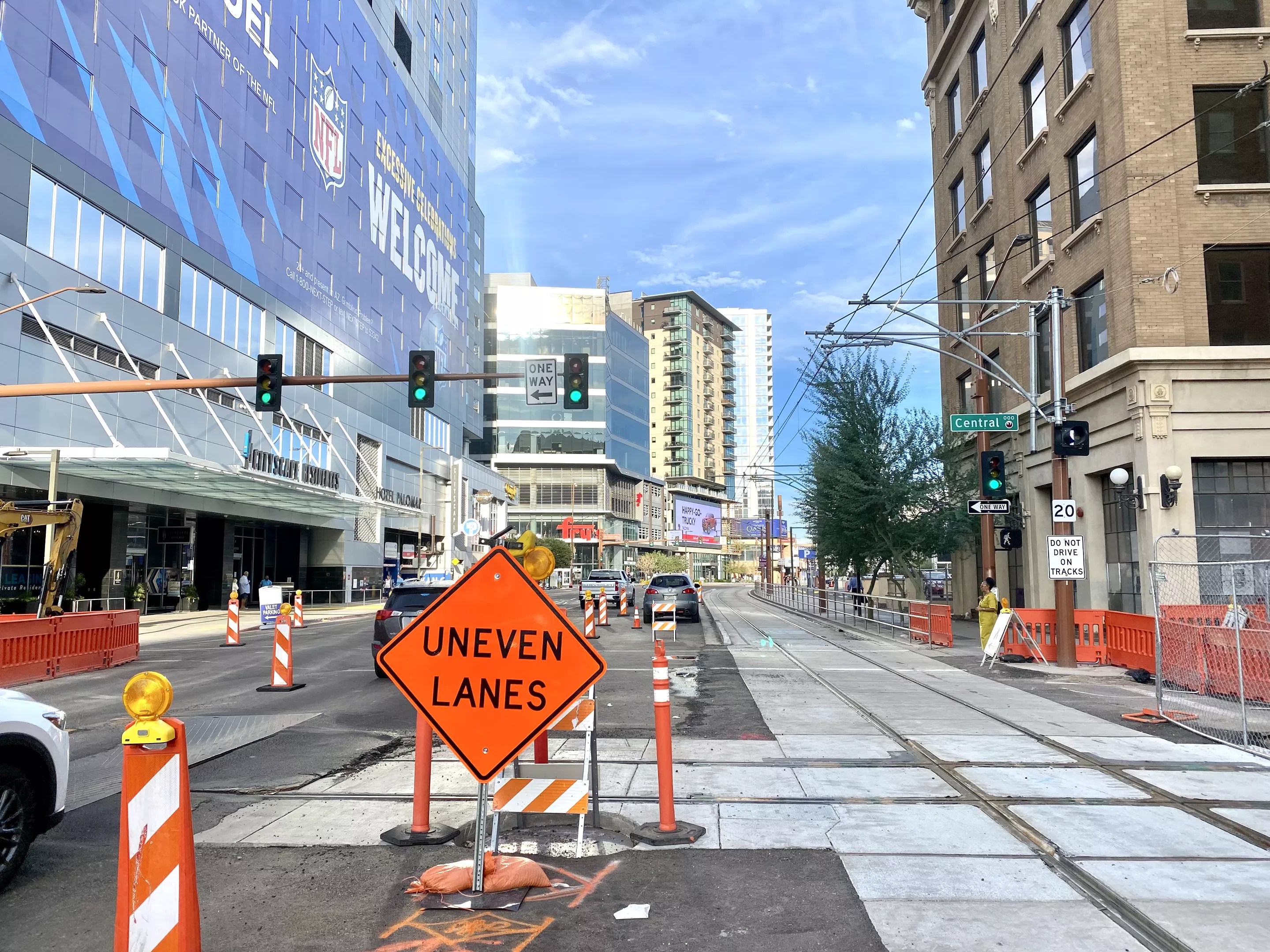
Uneven lanes and blocked roads are a regular downtown Phoenix occurrence during light rail construction.
Natasha Yee
Phoenix City Councilwoman Yassamin Ansari, the District 7 representative, has been instrumental in promoting the grant program. Her district is where much of the light rail construction is taking place.
“Businesses are eligible for up to $9,000 in grant money, which you do not have to pay back,” Ansari explains in a promotional video posted on Facebook, before telling businesses where to apply. She goes on to say that the program also provides business consulting services like web and social media support, which are available to businesses regardless if they get the grant.
When asked by Phoenix New Times about the waiver and release form on the application, Ansari deferred the question to the city’s attorneys, calling it “direct legal advice.” Neither city attorneys nor Prestamos CDFI responded to requests for comment by New Times.
Madeline Phipps, a public information specialist with Valley Metro, says that the organization also offers assistance in conjunction with the city of Phoenix. The Business Assistance Program works with restaurants, bars, and other enterprises along the light rail. It includes access to business advisors and help with access signage, special events, financial planning, marketing, and social media, according to the website.
Attorneys for the city drafted the waiver and release portion of the application, she explains. “Participation in the SBFAP is completely voluntary. Along with several criteria that keep SBFAP funding local and accountable, the waiver provides consideration in exchange for the benefits offered,” Phipps says in an email.
The city provided Martinez Saenz with signs and banners to help direct customers to Tres Leches through the construction. But she says they simply weren’t enough. She recently invested $20,000 for a brightly lit “Tres Leches Café” sign in addition to painting the exterior of the cafe bright pink and orange to attract attention. She’s also made Instagram reels instructing customers on how to navigate the construction.
“Most people completely avoid Central Avenue right now and I feel that wasn’t taken into account,” Martinez Saenz says. “We’re at about 30 percent of our sales.”
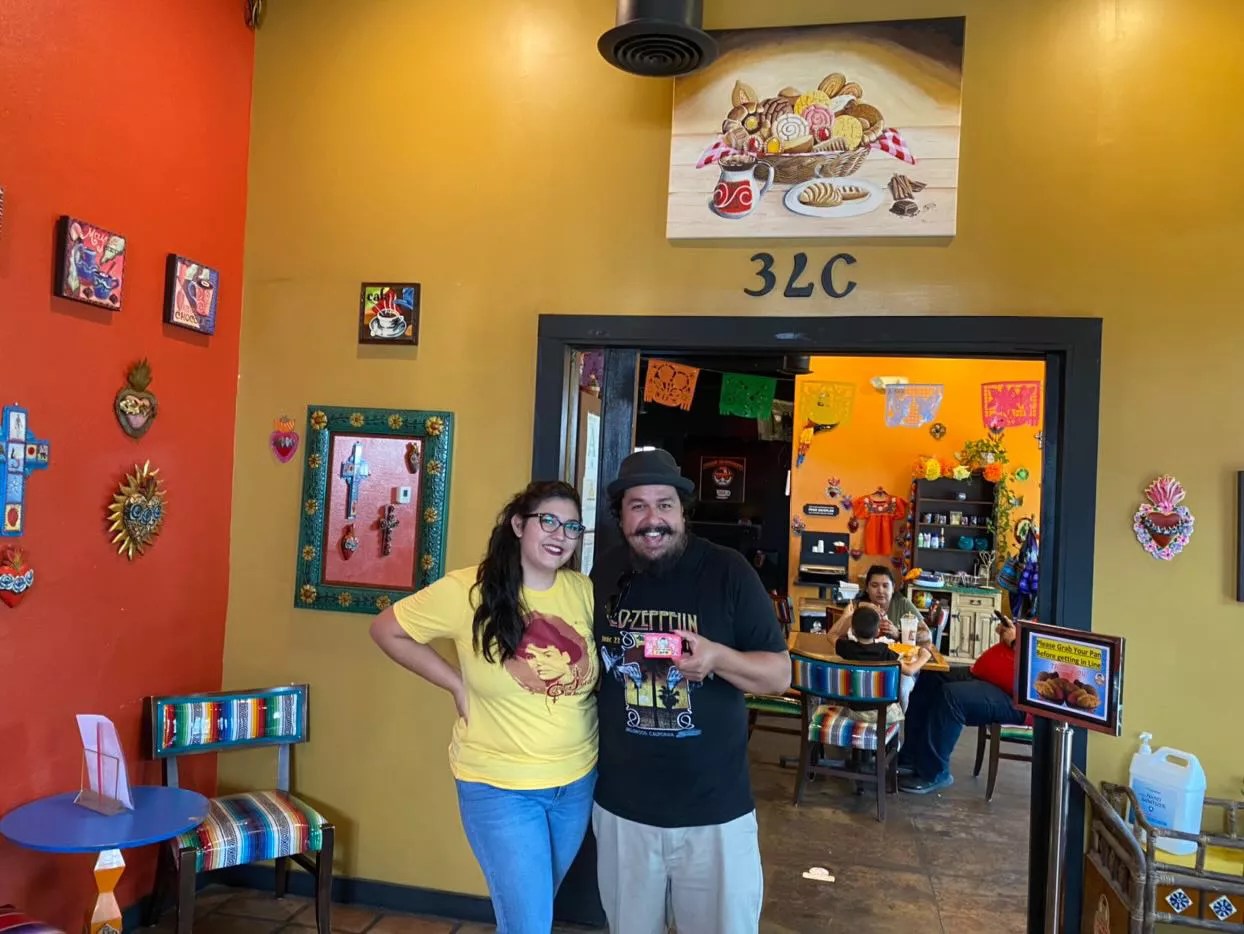
Rivera and Martinez Saenz inside Tres Leches Café at 17th Avenue and Van Buren Street.
Magaly Martinez Saenz
She and long-term partner Rivera have another Tres Leches location at 17th Avenue and Van Buren Street, which is luckily not along the construction route. They opened the South Phoenix drive-thru space in February 2020, right before businesses began to shut down due to the pandemic.
The drive-thru allowed people to safely grab their lattes while social distancing. But cars stopped filling the parking lot once construction ramped up, Martinez Saenz says. She and Rivera eventually made the tough decision to close the South Phoenix cafe, laying off 13 staff members after attempting to move many to the Van Buren Street location. That cafe also closed from June to September of 2021, due to the combined impact of lower sales and staffing woes.
Martinez Saenz and Rivera reopened the Tres Leches location along South Central in September 2021 with the help of a federal loan, as they decided the SBFAP’s fine print was too risky.
But other local business owners have had different experiences with the program. Albert Bahram owns Crazy Jim’s Restaurant, a breakfast and lunch eatery at Third Avenue and Washington Street. He received the SBFAP funding in both 2021 and 2022, and has utilized it for rent and utilities. It made just a small dent in the business’ overall losses though, Bahram says. He estimates that the restaurant has lost about $200,000 in revenue since the construction began.
“Do I think they’re taking longer than they should? Absolutely. This construction should be done by now,” Bahram says. “But I appreciate the city’s help. We have had to deal with the impact of COVID-19 and the light rail construction at the same time. It has been very difficult.”
Crazy Jim’s is situated near multiple city and state courthouses and both the Maricopa County Treasurer’s Office and Facilities Management Department. This normally results in a multitude of business from municipal employees and those visiting the courts. But it’s much more arduous for customers to get to the restaurant for a Chorizo Omelette or Gyro Platter these days. They face severely reduced vehicle access, a lack of parking, and confusing pedestrian walkways.
“I get lots of dispute charges every month. We make the food for carry-out, DoorDash, or Grubhub and some people never get the chance to pick it up because they can’t figure out how to get here. And it’s money straight out of my pocket,” Bahram says.

Azukar Coffee was located in a historic home near the intersection of Central Avenue and Baseline Road in south Phoenix.
Patricia Escarcega
While some small businesses struggle through the construction, even with the funding, others have completely closed their doors. Azukar Coffee began as a mobile beverage cart and opened a brick and mortar cafe in 2017 with the help of Arizona State University’s Prepped program. The program helps entrepreneurs, particularly those who identify as women and underrepresented minorities, to scale up their businesses. But the cafe’s owner announced its closure in September 2021.
“We cannot bear to see our community in shambles with construction, so Azukar is closed. We still have a lot of love to give and we look forward to a future!” read a September 2 Instagram caption from the south Phoenix coffee shop. In an accompanying farewell video, Sandra Flores, Azukar’s owner, thanked her customers.
“May everybody be well, be blessed, and peace be with you. Love you all,” she says. The business has remained closed since.
Bitter & Twisted Cocktail Parlour, a swanky and popular bar at Central Avenue and Jefferson Street, has also felt the impact, according to owner Ross Simon.
“We have construction coming from every angle,” Simon says. “We’re boxed-in anywhere you look – out front and side, in the back alley, and there’s even construction on top of us.”
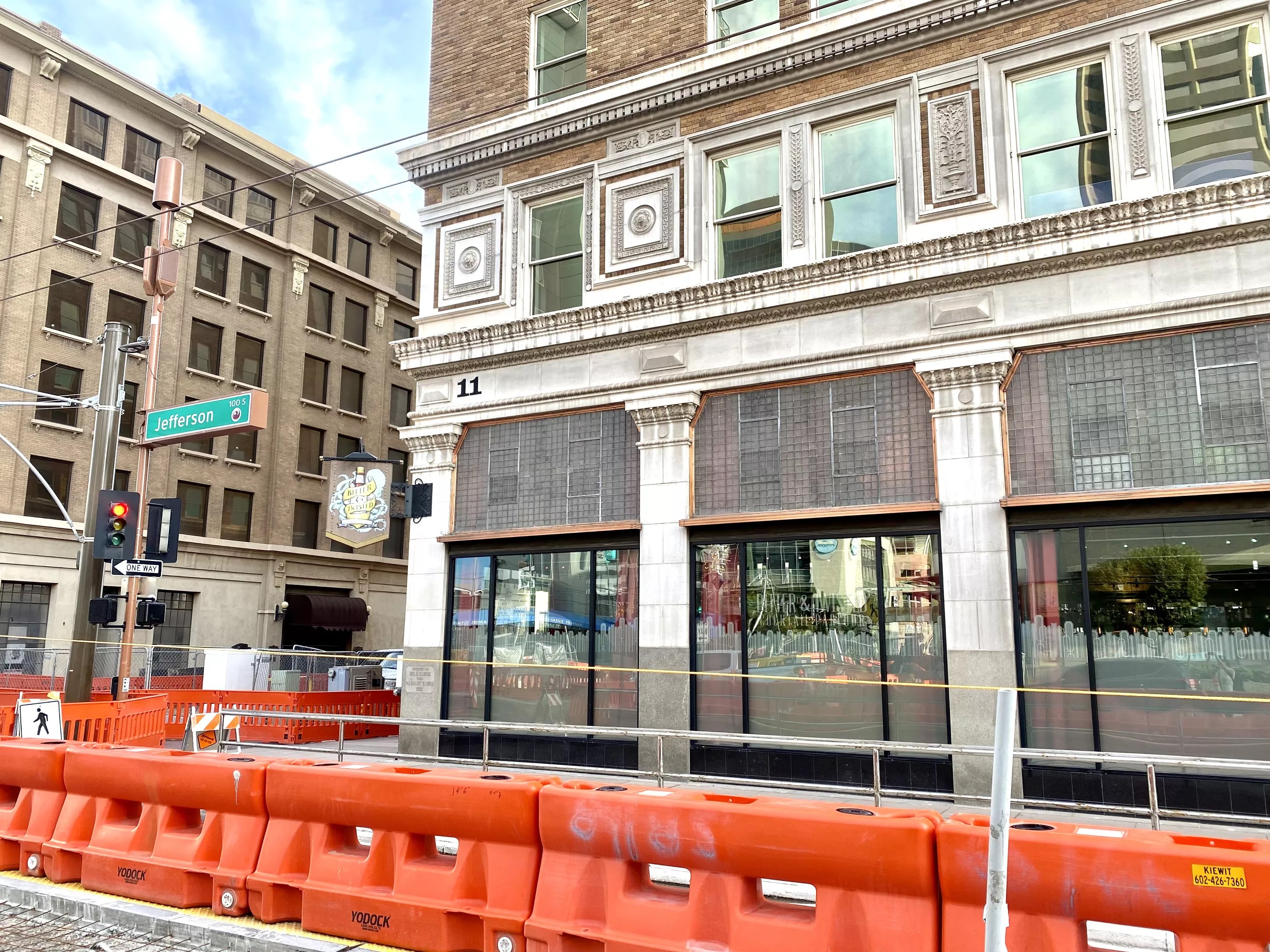
Orange blockades restrict access to Bitter & Twisted Cocktail Parlour.
Natasha Yee
Bitter & Twisted is situated on the ground floor of the historic Luhrs Building. The Moxy Downtown Phoenix, a hip and sleek hotel with a Tempe location near Arizona State University, is being constructed on the floors above the bar, and is set to open in May 2023. PEG Companies, the commercial real estate investor behind the new hotel, recently temporarily bought out the bar to facilitate construction, according to Bitter & Twisted in an October 4 Instagram post.
Prior to its most recent shutdown, the cocktail bar closed in March 2020 due to the pandemic, reopening for carry-out orders in September of the same year. Bitter & Twisted invited guests back inside with a socially-distanced space come October 2020, but the construction has dampened sales.
Simon estimates that the business has lost 20 to 30 percent of its revenue since construction began. And though he may have considered applying for the SBFAP, the bar does not qualify for the program since its annual revenue is too high, Simon says. Businesses must make less than $750,000 per year to qualify.
“We might make more than other businesses, but we also have more bills to pay,” he says, explaining the need to pay staff, order ingredients, a cost which has dramatically increased, and keep the lights on.
“Nobody who has been affected within these city blocks would get a penny of the funding,” Simon says. “But you better believe that anytime I see an excavator kick dust or my sidewalk being blocked, I’m on Twitter tagging city officials so that they know what’s going on here. This isn’t just about me as a bar owner. I have staff who I care deeply about, and they have bills to pay as well.”
Aaron DeFeo co-owns the neighboring bar Little Rituals with Simon. Located inside the Residence Inn by Marriott Phoenix Downtown, the cocktail destination has won multiple accolades, including a James Beard Award nomination for outstanding bar program. But that doesn’t make it immune to the disarray, DeFeo says.
“When the access to the business is gone, I have to ask how to navigate the area. And I’m here almost every day,” DeFeo says. “This is a walk-up destination in the middle of an entertainment district. We’re just glad to be nearing the end of this mess.”
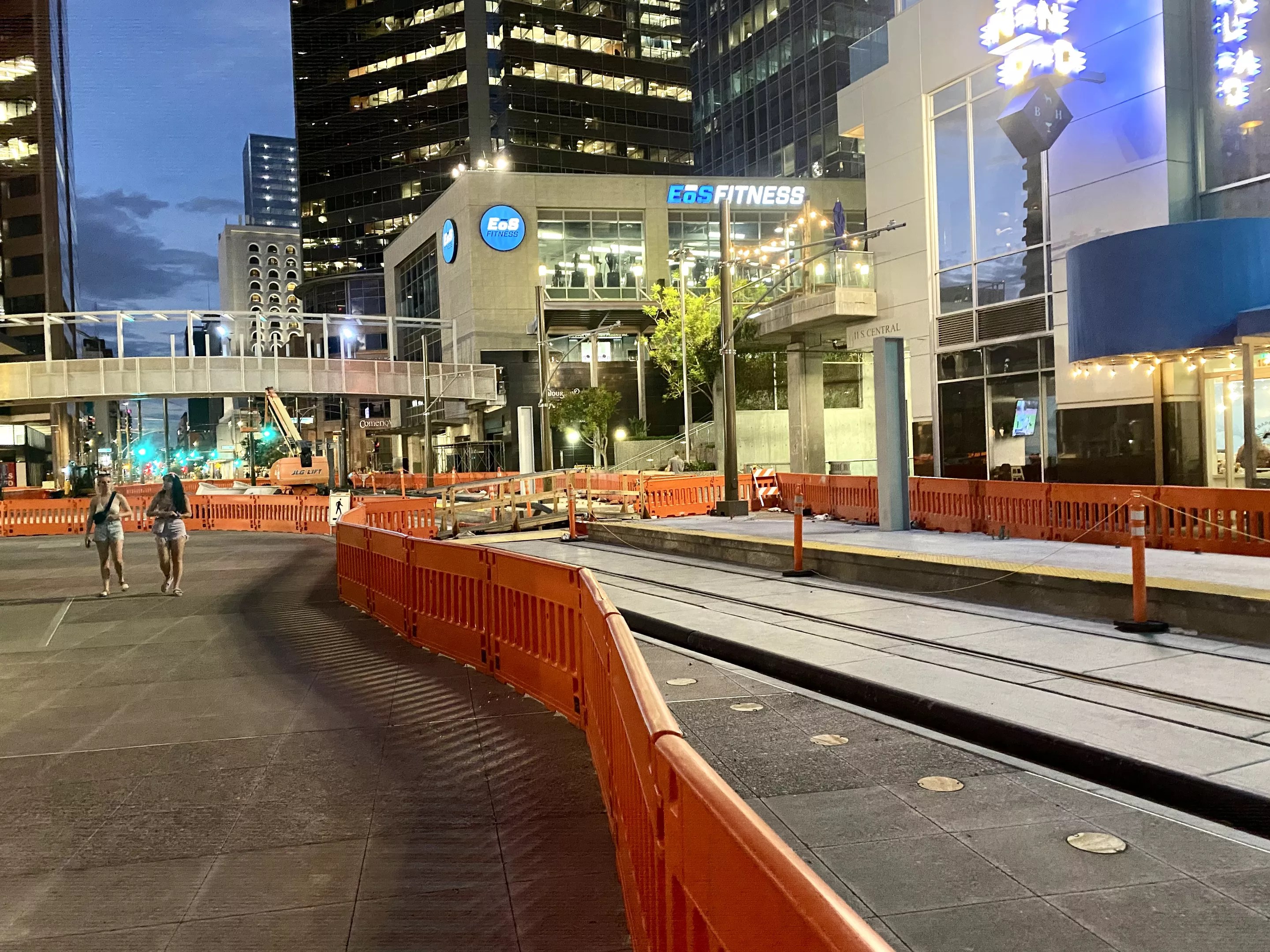
The light rail construction in downtown Phoenix is not easy to navigate.
Natasha Yee
Ansari says that she hopes for the construction to end by the summer of 2024, though the work in downtown Phoenix should be completed by the time the Super Bowl comes to the Valley in February 2023. The game will be held at State Farm Stadium in Glendale, coinciding with the dates for the 2023 WM Phoenix Open golf tournament in Scottsdale.
The two events are forecast to bring thousands of visitors to the Valley, with many hotels already booked up. Available rooms are on the market for upwards of $1000 per night. Though downtown construction may be complete by then, the area south of the city along the Central corridor still has a long way to go.
“I just wish the city would do more to help us,” Martinez Saenz of Tres Leches says. “It has received billions in funding for the light rail. If they would just ask small business owners what we need, we might tell them we need help with rent or signage. Instead, they take their best guess while our business suffers the consequences of all this construction. It is so difficult out here, but we are trying our absolute best.”